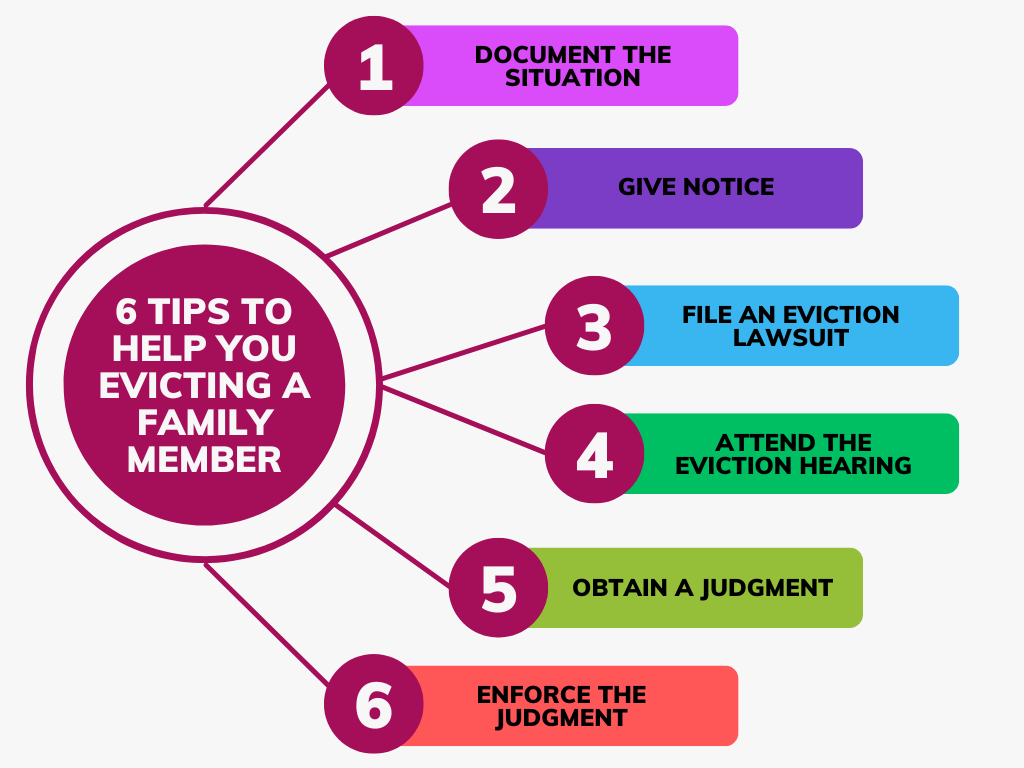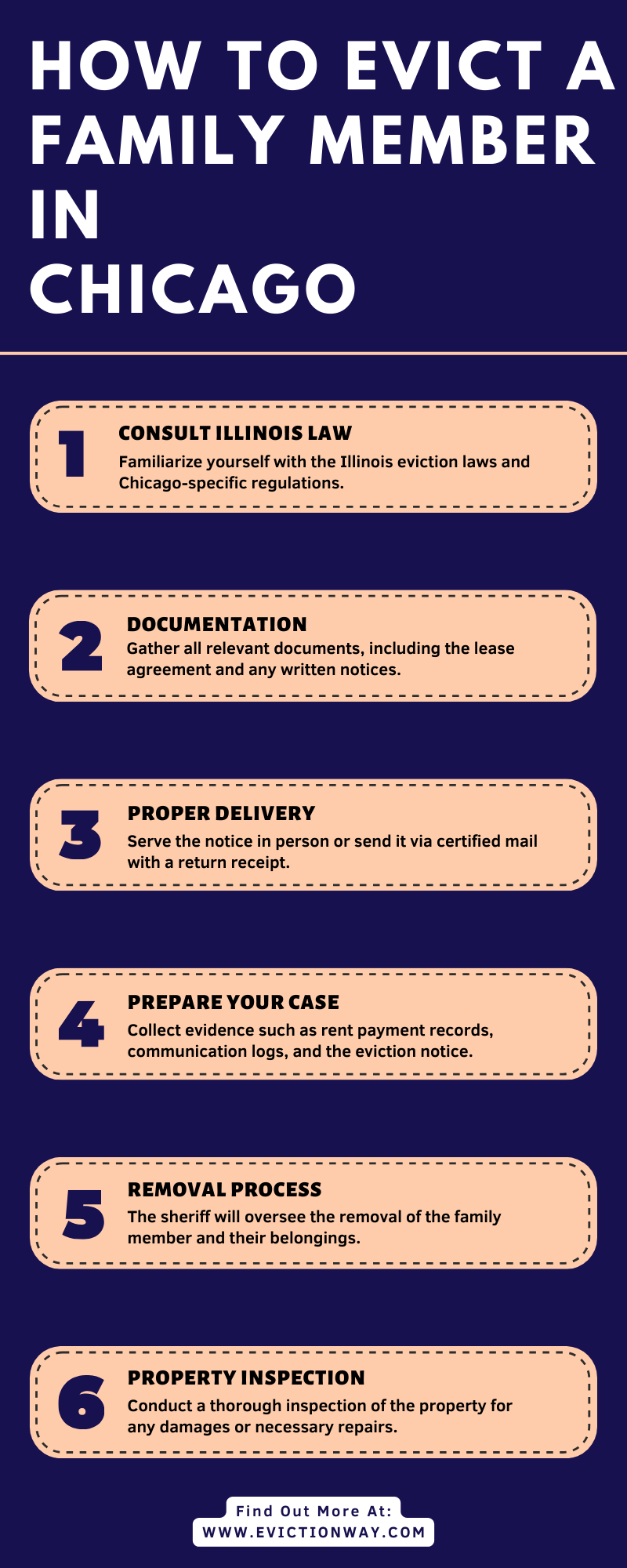Evicting a family member can be a difficult and emotional process, but it may be necessary to protect your rights and property. If you’re facing this situation in Chicago, you’ll need to follow specific legal procedures. This blog will guide you through the steps involved in evicting a family member in Chicago, including the legal requirements, methods for eviction, and tips for handling the process respectfully.
To evict a family member in Chicago, you must first establish that they are not a legal tenant. This means they do not have a lease or rental agreement with you and have not been living in the property for long enough to establish tenancy rights. If they are a legal tenant, you will need to follow the formal eviction process, which involves filing a complaint with the court and obtaining a judgment of possession.
Once you have established that your family member is not a legal tenant, you can proceed with the eviction process. There are two main methods for evicting a family member in Chicago: a self-help eviction and a court-ordered eviction. A self-help eviction is when you physically remove the person from the property without going through the court system.
However, this is only legal if the person is not a legal tenant and if you do not use excessive force. A court-ordered eviction is when you obtain a judgment of possession from the court and have the sheriff remove the person from the property. This is the safest and most effective way to evict a family member, but it can also be more time-consuming and expensive.

How To Evict a Family Member In Chicago
Evicting a family member is never easy, but it may be necessary to protect your rights and property. If you’re considering evicting a family member in Chicago, here are six tips to help you through the process:
1. Document the Situation
Keep a record of all interactions with your family member, including any incidents of violence, property damage, or other disruptive behavior. This documentation will be helpful if you need to file an eviction lawsuit.
2. Give Notice
Before you can evict a family member, you must give them proper notice. The amount of notice required varies depending on the circumstances, but it is typically 30 days.
3. File an Eviction Lawsuit
If your family member does not vacate the property after you give them notice, you will need to file an eviction lawsuit. The lawsuit will be filed in the Circuit Court of Cook County.
4. Attend the Eviction Hearing
At the eviction hearing, you will need to present evidence to support your claim for eviction. Your family member will also have the opportunity to present their side of the story.
5. Obtain a Judgment
If the judge rules in your favor, you will be granted a judgment for possession of the property. This judgment will give you the legal right to evict your family member.
6. Enforce the Judgment
Once you have a judgment for possession, you can enforce it by having the sheriff evict your family member. The sheriff will physically remove your family member from the property and change the locks.

Additional Resources for Chicago, Illinois eviction help:
Eviction notice Chicago
In Chicago, when a tenant violates the terms of their lease, the landlord typically issues an eviction notice or a notice to quit. This document notifies the tenant of the breach and allows them a certain number of days to address the issue or move out.
It’s a crucial step in the eviction process and provides tenants with a final opportunity to resolve the issue before further legal action is taken.
You can download Eviction notice Chicago here.
How Much Does it Cost to Evict a Family Member in Chicago?
Evicting a family member can be a difficult and expensive process. The cost of eviction will vary depending on the specific circumstances of the case, but there are some general costs that you can expect to incur.
| Cost | Description | Estimated Range |
|---|---|---|
| Filing Fees | Court fees associated with filing the eviction lawsuit. | $150 – $300 |
| Attorney Fees | Legal representation throughout the eviction process (optional but recommended). | $1,000 – $5,000 |
| Service Fees | Process server costs to deliver the eviction notice to the family member. | $50 – $100 |
| Lockout Fees | Sheriff’s fees to remove the family member and their belongings if necessary. | $100 – $200 |
| Late Fees (optional) | If applicable, any late fees accrued by the family member during their stay. | Varies |
- Filing fees: The first step in the eviction process is to file a complaint with the court. The filing fee for an eviction case in Chicago is $150.
- Service of process: Once the complaint has been filed, it must be served on the tenant. The cost of service of process will vary depending on the method of service.
- Attorney fees: If you hire an attorney to represent you in the eviction process, you will be responsible for their fees. Attorney fees can vary widely, so it is important to get a quote from an attorney before hiring them.

FAQs: Evicting a Family Member in Chicago
Here are some of the most frequently asked questions about evicting a family member in Chicago:
What are the legal grounds for evicting a family member in Chicago?
In Chicago, you can evict a family member if they have violated the terms of their tenancy, such as not paying rent or breaking the lease. You can also evict a family member if they have engaged in criminal activity or have caused damage to the property.
What is the process for evicting a family member in Chicago?
The process for evicting a family member in Chicago is similar to the process for evicting any other tenant. You must first give the family member a written notice to vacate the property. If the family member does not vacate the property within the specified time period, you can file an eviction lawsuit with the court.
How long does it take to evict a family member in Chicago?
The length of time it takes to evict a family member in Chicago will vary depending on the circumstances of the case. However, the process can take several months, so it is important to start the process as soon as possible.
What are the costs associated with evicting a family member in Chicago?
The costs associated with evicting a family member in Chicago will vary depending on the complexity of the case. However, you can expect to pay for court costs, attorney fees, and other expenses.
Can I evict someone without a lease in Chicago?
Yes, in Chicago you can legally evict a tenant even without a written lease agreement, but the process must comply with state-specific eviction laws.
What is the minimum eviction notice in Chicago?
The minimum eviction notice in Chicago is 30 days for non-payment of rent or lease violation.
How long does an eviction stay on your record in Chicago?
In Chicago, an eviction record stays on your record for seven years.
What are some tips for evicting a family member in Chicago?
Here are some tips for evicting a family member in Chicago:
- Document everything: Keep a record of all communications with the family member, including any notices to vacate and any incidents of criminal activity or property damage.
- Be prepared to go to court: If the family member does not vacate the property voluntarily, you will need to file an eviction lawsuit with the court.
- Get legal help: An attorney can help you with the eviction process and ensure that your rights are protected.
Related:
How to Evict a Family Member in Kent
